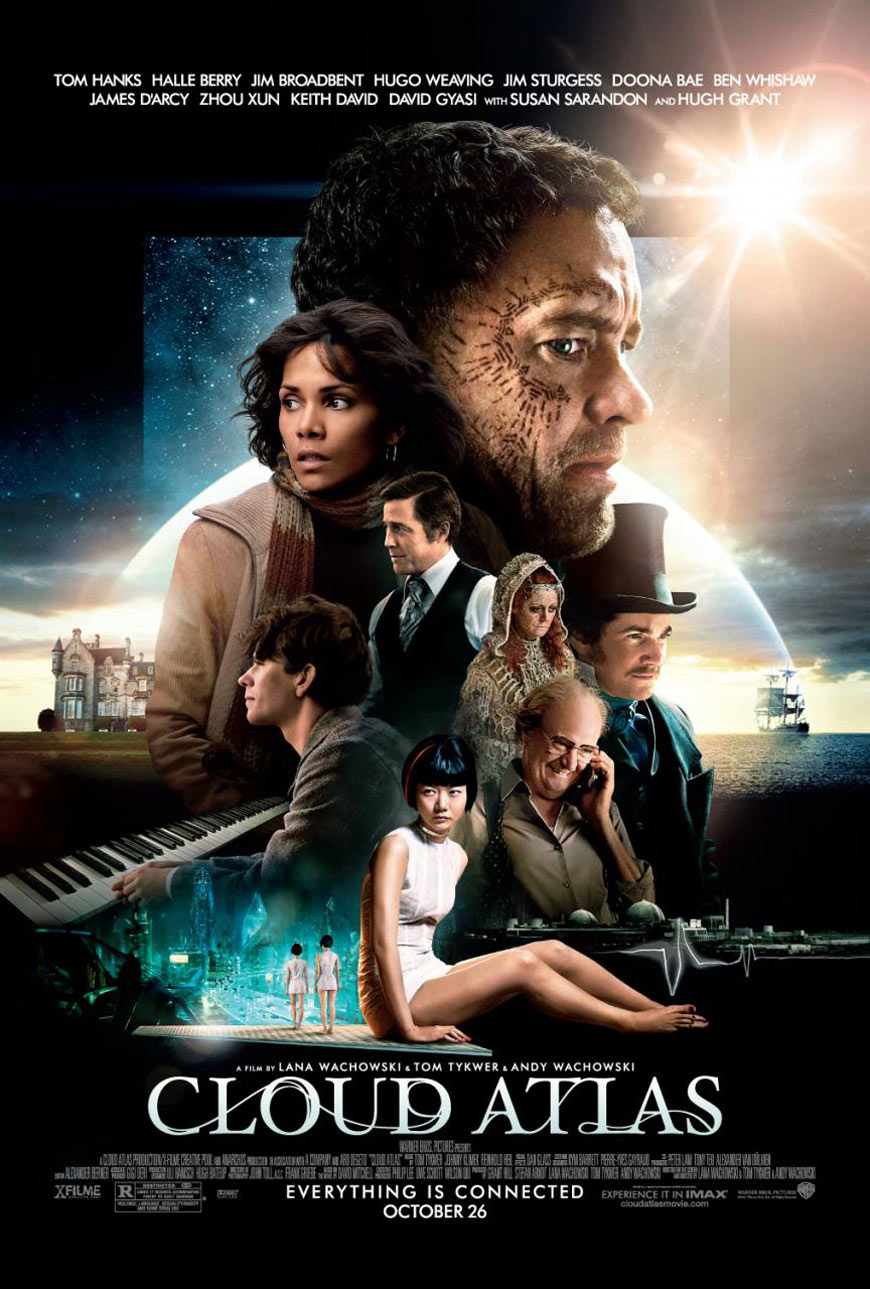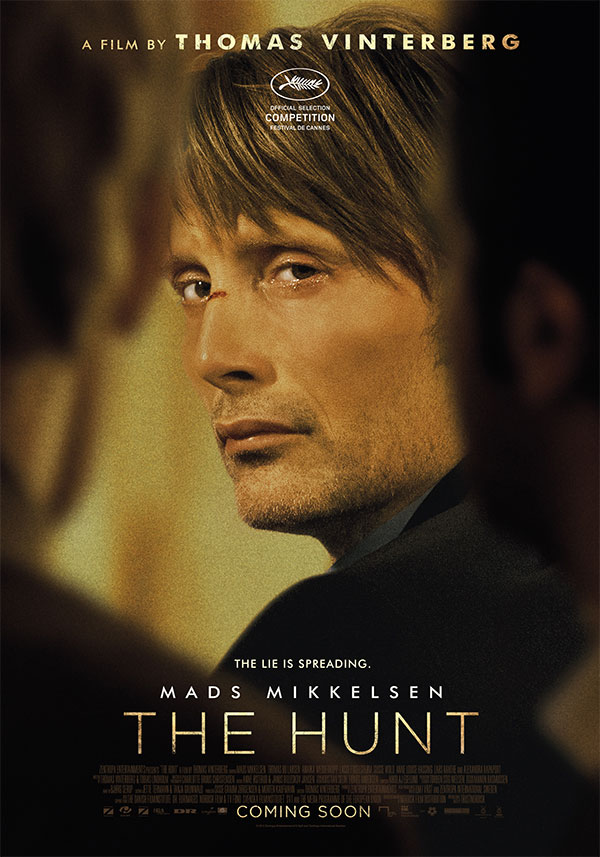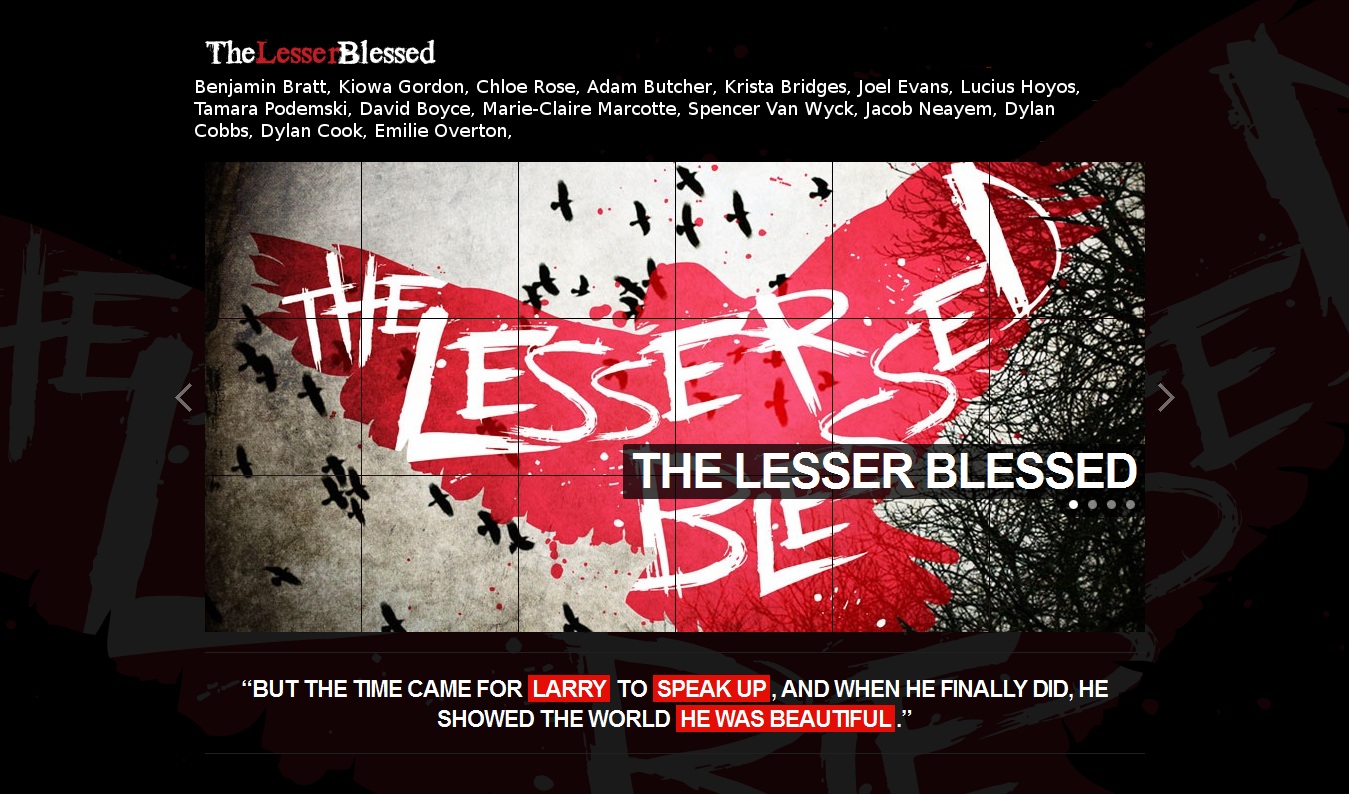Cloud Atlas (2012, directed by Lana and Andy Wachowski and Tom Tykwer)
(Note the credit: Lana and Andy, not just "the Wachowskis". It's fitting, in a way, that this is the movie for which Lana first gets billing under her new name, as Cloud Atlas addresses questions about the nature of human identity, what it means in fact to be 'human', as well as dabbling in themes of persecution and freedom. Now as to how successfully it addresses those themes and questions, well...)
Based on a thought-to-be-unfilmable book, Cloud Atlas tells six disparate stories set in six disparate time periods: a harrowing ocean voyage in the 1800s, a young composer struggling to make a name for himself in the 1930s, an intrepid reporter uncovering a scandal in the 1970s, the comic escapades of an aging publisher in the present day, the education and enlightenment of a cloned worker in Seoul in the 2100s, and a desperate quest for the remains of a lost civilization in the far future. The film hops back and forth between each story, gradually teasing out links between them, while also featuring nearly the same cast of actors in each playing sometimes wildly different roles. The result is not the confusing mishmash it might have been: each story and each time period is clearly distinct from each other in look and feel, and thanks to makeup, language and accent there's never any confusion about who or what you're seeing on screen.
That, alone, makes Cloud Atlas an impressive achievement, but there's a lot more going on in it than just some nice plot-juggling. On a certain level it's also a puzzle movie. Each story shows up as a story in the succeeding time period: the young composer, for instance, finds a torn copy of a book that purports to be a journal of that 1800s ocean voyage, while the aging publisher is sent a manuscript presenting the '70s investigation as a crime novel. The entire film is also bookended by an old storyteller entertaining children around a fire. Those touches adds a nice bit of uncertainty to the proceedings, creating a smidge of doubt as to whether the stories are supposed to be 'real' or merely fictions within the larger fiction. There's also a fun game of 'spot the actor' that goes on once you realize how the casting operates, as the roles of some very recognizable faces are not always obvious.
That uncertainty is actually necessary, because unfortunately the film felt just a little too simplified and straight-forward thematically. I hesitate to say it's dumbed-down for a mass audience, but I'm not sure I can be more charitable. When you get down to its core, Cloud Atlas tells us that freedom is good, persecution is bad, and people are people. Well, duh. It isn't enough, for instance, to have Sonmi-451's story in Neo Seoul be one of a "fabricant" and her dawning realization that despite her origins she is as human as someone who came from a womb. No, the futuristic society that created her has to be shown treating her as inhumanely as we treat livestock today, if not worse. And those elements are also reflected in the stories of the young man on the ocean voyage, who befriends a runaway slave and eventually becomes an abolitionist; and in the publisher's imprisonment in an old age home against his will; and the struggles faced by the composer due to his sexual orientation. Such links may help make the movie feel more coherent, but they also make it feel awfully on the nose at times, like it's one story told six different ways as opposed to six different stories. Granted, that is one of the things the film is trying to say, but it doesn't so it with much subtlety.
The other area in which Cloud Atlas feels like something of a let-down is in the performances. Tom Hanks is particularly cringe-worthy in a couple of places, portraying a thuggish "British" author (I'm putting British in quotes because his accent is just excruciating), while neither he nor Halle Berry come across looking good trying to handle a future island dialect that veers dangerously close to Jar-Jar territory. The makeup also isn't up to the herculean tasks set for it. Hugo Weaving is supposed to look comical as the Nurse Rached-like matron at the old age home, but Jim Sturgess looks no more like a Korean resistance fighter than Boris Karloff did an evil Chinese mastermind, and dotting Doona Bae's face with freckles doesn't allow her to pass as the very British wife of the ocean voyager.
The film's strengths more than balance out those missteps though. In terms of cinematography and effects it looks amazing across all six time periods while still always feeling like one movie instead of six different ones, which is even more astounding when you consider the Wachowskis shot three segments and Tykwer shot three using two completely separate crews. The performances are for the most part very good (Jim Broadbent will never let you down, while of the supporting cast Hugh Grant of all people is tremendous) and certainly its themes are worthy ones, even if they get treated a bit shallowly. In fact if I'd compare Cloud Atlas to anything (and I know it's a weird comparison, so bear with me on this) it would be the film that really cemented Hanks as an A-list star, Forrest Gump. The two have nothing in common plot-wise, but both are incredible technical achievements that sell their source material a bit short in order to take a shot at reaching a wider audience. That calculation paid off big-time for Gump, but I'm not convinced it will for Tykwer and the Wachowskis' crazy collaboration. For the record I liked it far more than Zemeckis' facile blockbuster though, and I'm really hoping it does strike the necessary chord with audiences to become a hit.
Whatever flaws Cloud Atlas has, we need more movies with this kind of ambition.
^^^^^^^^^^^^^
The Hunt (2012, directed by Thomas Vinterberg)
A kindergarten student gives her favorite teacher and her father's best friend an innocent peck on the lips. He gently scolds her and tries to let her know that the peck was inappropriate. Feeling rejected, she tells an ugly lie to another teacher. From such small seeds are tragedies born.
The Hunt is a frustrating film, which is suspect is exactly the reaction Vinterberg wants from his audience. Lucas (Mads Mikkelsen, tremendous as always) is too perfectly nice. A divorced dad whose ex-wife seems to be the one with the issues he struggles to deal with being separated from his son but makes the best of it, and is even just starting a relationship with a woman who works at the school. There's no chance of there being anything dark or sinister in his character. He's clearly an innocent man caught up in a horror show. And watching that horror show unfold makes you want to reach into the screen and shake some sense into all the dumbasses who make it happen. Fear and ignorance spread like wildfire. Even young Klara is able to recognize something isn't right, that what she's inadvertently unleashed needs to be put back down, but even though she tries to tell the "adults" that she made it up no one wants to listen. Her denials are dismissed as an attempt to suppress her memories. Lucas' life is ruined in an instant, as Klara's one little lie turns into a witch hunt and a supposed epidemic of abuse among all the kids in Lucas' charge.
In fact the dominoes seem to fall too neatly as the lie escalates, and critical thinking skills are found to be completely lacking among Lucas' friends and neighbors, but that has to be Vinterberg's point. False accusations and witch hunts happen in real life, and this is more or less exactly how they happen. It's a little too pat in the film, but that just heightens your sense of impotence in the face of the injustice. If it's frustrating to watch it's because human weakness can be frustrating to watch. We should be better than this, and far too often we aren't.
Mikkelsen's ability and willingness to let himself get broken down completely and discover what's at his character's core is on full display, and his performance saves the film. The Hunt feels like a lesser effort from Vinterberg in the end, simply because things are just too black and white, but that's hardly an indictment. Personally, I'll take lesser Vinterberg over peak Haneke any day.
^^^^^^^^^^^^^^^
The Lesser Blessed (2012, directed by Anita Doron)
As long as kids continue to come of age, there will be coming-of-age stories. No matter what time, place and culture the story's set in, the near-universality of the passage into (or at least towards) adulthood gives an audience an easy hook into a worldview they might not otherwise be able to relate to. You might not be a snot-nosed teen in post-war America, or a young woman finding her place in the world in England in the 1800s, or a troubled boy in '50s Paris, but you can find enough common ground with them to give yourself over to their journeys.
Which is not to say that The Lesser Blessed (the film, at least... I haven't read the book it's based on) is a classic on the level of Catcher In the Rye, or Jane Eyre, or the 400 Blows. But it's unique enough to carve out a little space of its own next to those heavyweights.
Larry is a gawky, withdrawn teenager whose past can be traced in the burn scars all over his body. A member of the Dogrib tribe living in a small town in the Northwest Territories, he seems to wander through his days listening and drumming along to heavy metal, pining after perky blonde Juliet and avoiding getting beaten up by the class bully Darcy. When bad-boy Johnny Beck arrives at school though, putting Darcy in his place and hooking up with Juliet, Larry finds himself drawn out of his shell and forced to confront the demons he's been denying.
While there's nothing terribly original about the basic setup, The Lesser Blessed gets full value out of its northern setting and native heritage. In another time and place Larry might have become a Dogrib medicine man or prophet, but in a 21st century high school he's just an awkward kid prone to dreaming of the bush and making sweetly cryptic, poetic pronouncements. The sense of isolation is palpable; living in a place where there isn't much to do other than drink and get high Larry's options for escape are very limited, and running away means sleeping outdoors and a potentially quick death whether you're prepared for what nature can throw at you or not.
Joel Nathan Evans mostly strikes the right notes as Larry and Benjamin Bratt is solid as the new guy in Larry's mom's life, but it's Kiowa Gordon (yes, one of the Twilight hunks) that makes the biggest impression as Johnny, letting just enough of his pain show through to explain, if not excuse, his behavior.
The Lesser Blessed is aptly named. It isn't the greatest coming-of-age film you'll ever see, but you won't regret seeking it out.
Follow me, and give me audience friends. Cassius, go you onto Twitter.
@AntonSirius





